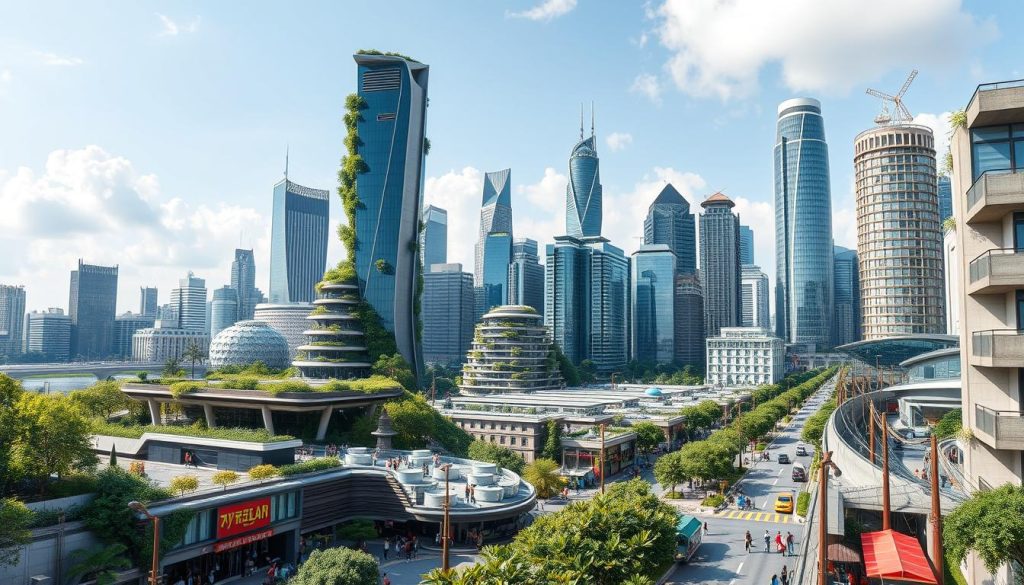The Asian real estate market is going through big changes. These changes come from how people behave, new technology, and changes in the economy. All these factors are creating many new business ideas.
These ideas use new strategies to meet the changing needs of the market. Investors and entrepreneurs have great opportunities. They need to understand these trends well to make the most of them.
This section introduces the exciting changes in Asia’s real estate. It shows how important innovation is for its future.
The Rise of Real Estate Innovation in Asia
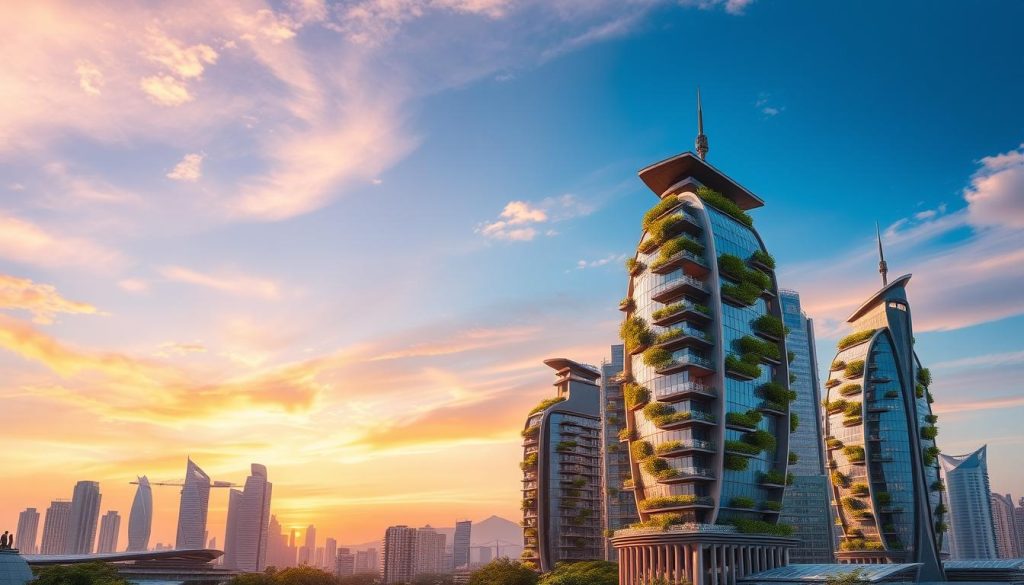
The real estate sector in Asia is changing fast. This is due to many factors, including more people moving to cities and foreign investors coming in. This has led to a big increase in new property developments in major cities.
Technology is key to this change. It makes real estate work better and helps people get involved more easily. Companies use big data to make smart choices about where to build and invest. This makes things run smoother and meets the needs of today’s tech-loving customers.
Looking at successful examples, we see how these trends work in real life. Some developers use smart tech in their buildings. This offers green living options that meet today’s standards. These examples show that real estate innovation is more than just a trend. It’s a big change in how we live and work.
Emerging Trends in Asian Real Estate Markets
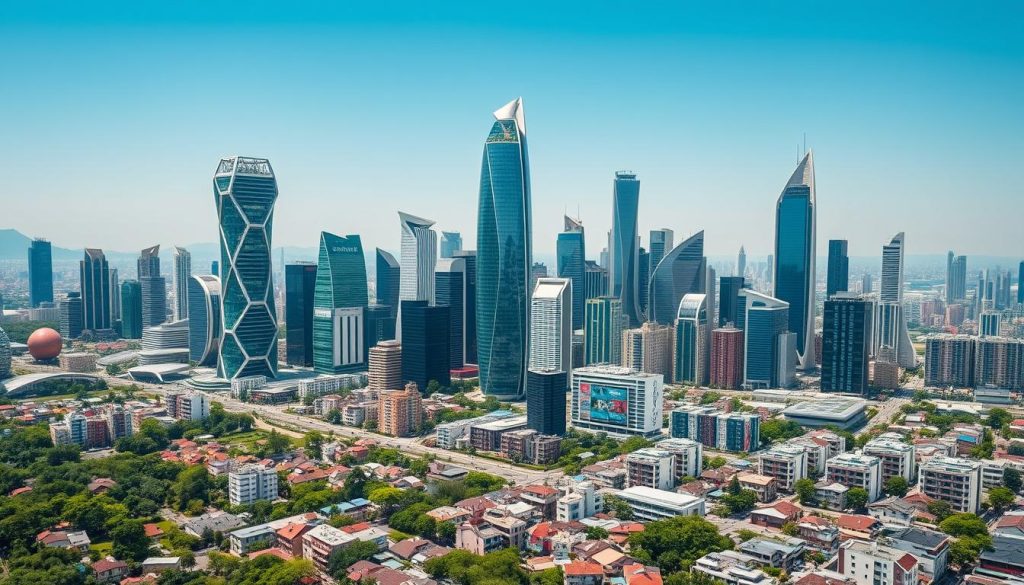
The Asian real estate market is changing fast. It shows new trends that match what people want and need. A big change is more people wanting to rent, especially the young. They look for places that are affordable and flexible in cities.
This shift means there are more types of rentals available. They meet different lifestyles and needs.
E-commerce is also changing the market. Online shopping is getting more popular. This means businesses need places that help them deliver goods quickly.
Warehouses and distribution centres are becoming key. They show how retail and logistics are evolving in Asian real estate.
There’s a big focus on sustainable developments too. People care more about the environment. So, buildings are using eco-friendly materials and saving energy.
This trend meets what consumers want and helps the planet. It also meets global goals for sustainability.
These changes show how fast and flexible the Asian real estate market is. It’s all about being adaptable and green. Keeping up with market analysis is crucial for growth and new ideas.
Real Estate Business Ideas in Asia
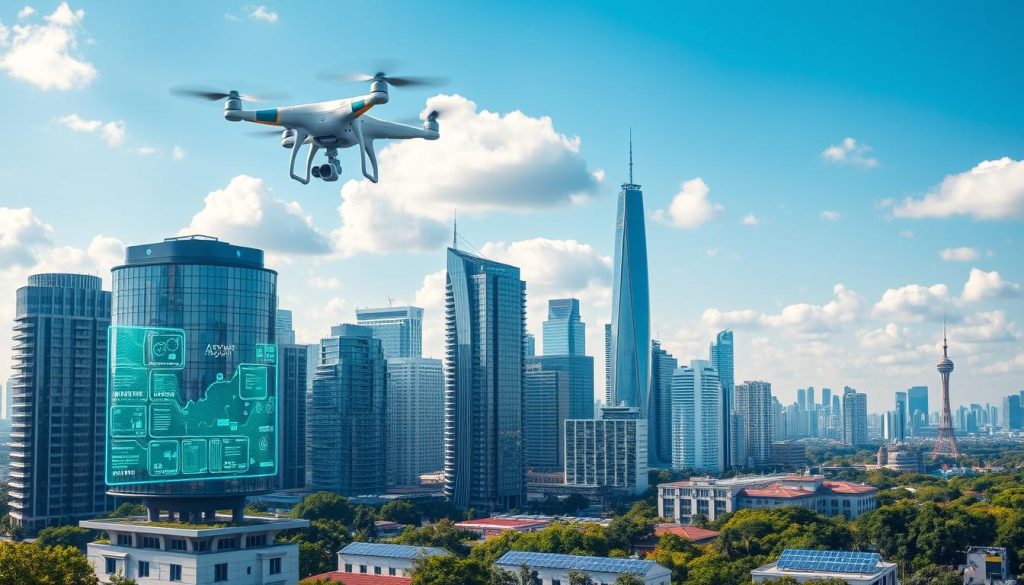
Technology is changing the real estate scene in Asia. New solutions are making things easier and better for everyone. They help with communication, rent, and more. This opens up new ways to improve customer happiness and work better.
Leveraging Technology for Property Management
Using the latest tech helps real estate firms keep in touch with tenants and cut down on paperwork. These platforms offer cool features like:
- Online portal for tenant requests and maintenance tracking
- Automated reminders for rent payments
- Data analytics for performance monitoring and decision-making
With these tools, companies can respond faster to tenant needs.
Utilising Virtual Reality for Property Viewings
Virtual reality viewings are a big step forward in showing off properties. They let people see places online, making it easier to explore. The good things about virtual reality include:
- Enhanced engagement through immersive experiences
- Reduction of travel time for clients and agents
- Improved ability to visualise spaces, leading to quicker decision-making
Virtual reality helps real estate firms reach more people. It lets potential clients see properties from home.
Green Building Practices in Asia
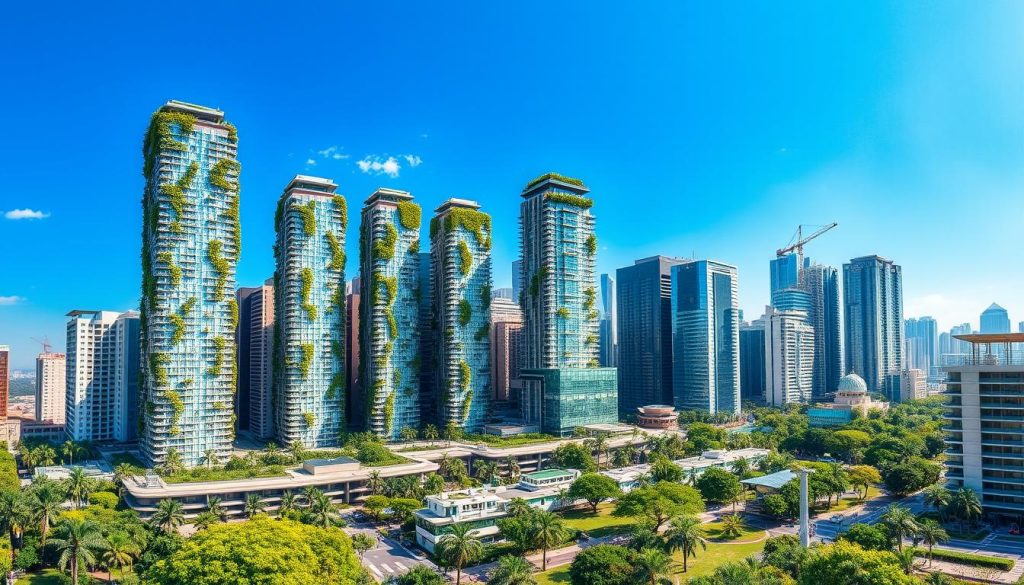
Green building is becoming more popular in Asia. It shows a move towards buildings that are good for the planet. These buildings are not just better for the environment. They also make developers more money in the long run.
The Leadership in Energy and Environmental Design (LEED) certification is a big deal worldwide. It helps buildings use less energy and resources. This makes buildings more efficient and better for the planet.
Many projects in Asia are now using sustainable architecture. This includes tall buildings in big cities and homes for communities. They use materials and systems that save energy and cut down on waste.
More people want to buy homes that are good for the planet. This is changing how the market works. Developers are now making buildings that are better for the environment. This makes them stand out in the market.
Building green is good for the planet and for real estate. As people learn more about climate change, green buildings will become even more important. They will shape the future of real estate in Asia.
The Demand for Co-Working Spaces
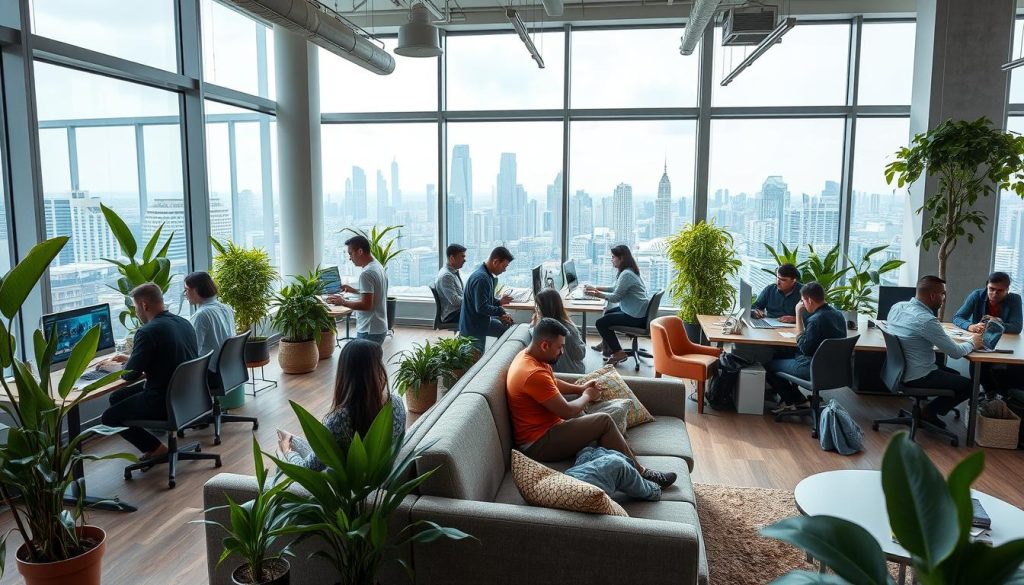
In recent years, co-working spaces have become common in urban areas of Asia. This change is due to more start-ups and freelancers. These spaces offer flexible work options that many professionals find appealing.
Catering to Start-ups and Freelancers
Remote work and freelance projects have grown in popularity. Co-working spaces meet this need by offering resources and support. They have features like:
- Flexible lease options that adapt to changing business needs
- Networking opportunities for collaboration and partnership
- Access to modern facilities and technology without the overhead of traditional offices
- Enhanced work-life balance through a community-focused environment
Co-working spaces support start-ups and encourage innovation. They bring together different talents. As they grow, they play a key role in the changing work landscape, meeting the needs of freelancers.
Real Estate Crowdfunding Platforms

Crowdfunding has changed how we invest in real estate, making it more accessible. Platforms like Fundrise and RealtyMogul are leading this change. They let many investors come together to fund big projects.
Now, you can invest in real estate with less money than before. This is great for people who thought they couldn’t get into the property market. The main benefits of real estate crowdfunding are:
- Lower barriers to entry for small investors
- Diverse investment options across different property types
- Potential for higher returns through collective funding
In the Asian market, crowdfunding has helped grow investments in many areas. This includes homes and business buildings. These platforms show a move towards more open investment ways. They make real estate chances available to more people.
Short-Term Rental Opportunities
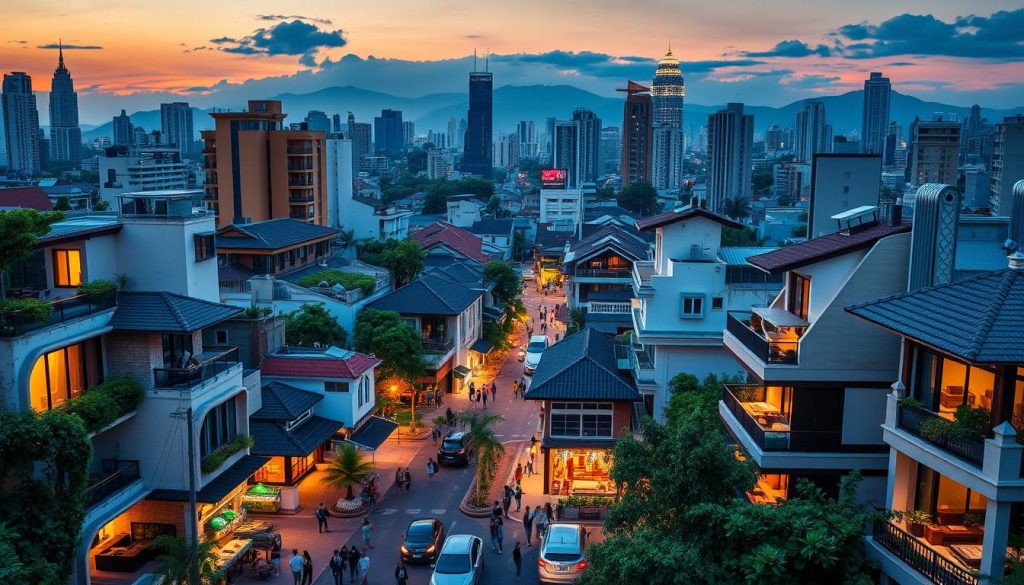
Short-term rental platforms like Airbnb have changed the game in Asia’s property market. They offer new ways to invest in tourism and flexible stays. Investing in short-term rentals means higher occupancy and a wide range of guests.
The Impact of Platforms like Airbnb
Airbnb has changed how we think about hotels and property. It lets owners list their places easily, reaching people worldwide. This has created big investment chances, especially in tourist hotspots. Investors can make more money than with long-term rentals.
- Increasing demand for unique accommodation experiences.
- Flexibility in pricing and availability.
- Engagement with local communities through hosting.
But, there are also challenges. Laws vary by country and city, affecting how you can run your rental. Knowing these rules is key for success in short-term rentals.
Luxury Property Developments in Urban Areas
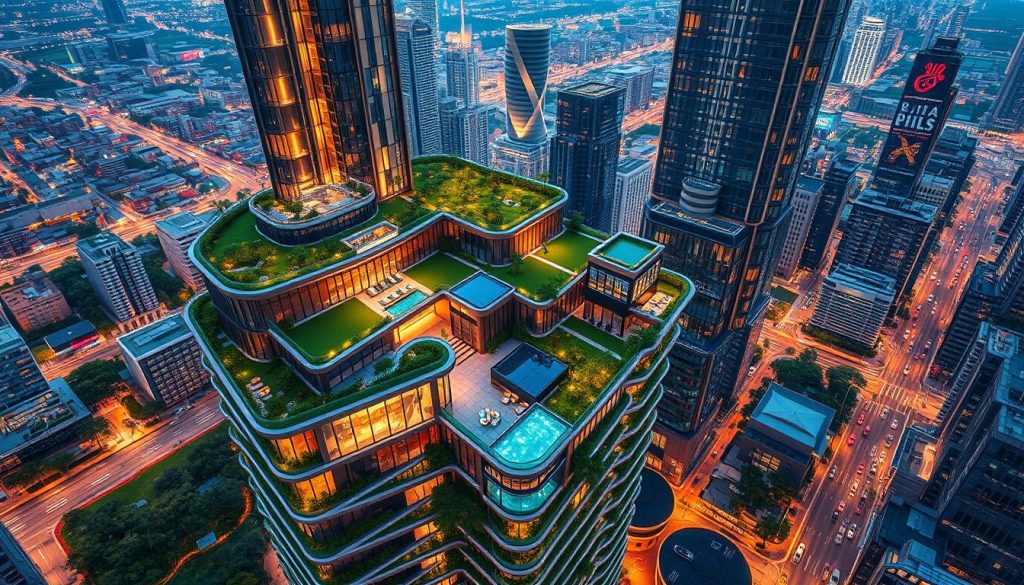
The urban development scene is changing fast, especially in big cities across Asia. This change shows a big move towards luxury properties. These are in high demand by wealthy people and investors looking for top-notch living and business spaces.
More people have money to spend, thanks to a strong economy. This is driving the need for high-end developments.
Foreign investment is also on the rise, boosting the luxury real estate market. Investors are drawn to cities that offer good returns and exciting lifestyles. Luxury homes in these places often have modern designs and top-notch features, meeting today’s high standards.
- Unique architectural styles that set new benchmarks in design.
- Luxury amenities including state-of-the-art fitness centres and exclusive rooftop gardens.
- Sustainable features, reflecting a growing awareness of environmental issues.
- Proximity to cultural landmarks and high-end retail outlets enhances attractiveness.
These elements make urban development a tempting place for investment. Luxury properties are not just homes but valuable assets in the fast-paced Asian real estate market.
The Role of Smart Homes in the Future of Real Estate
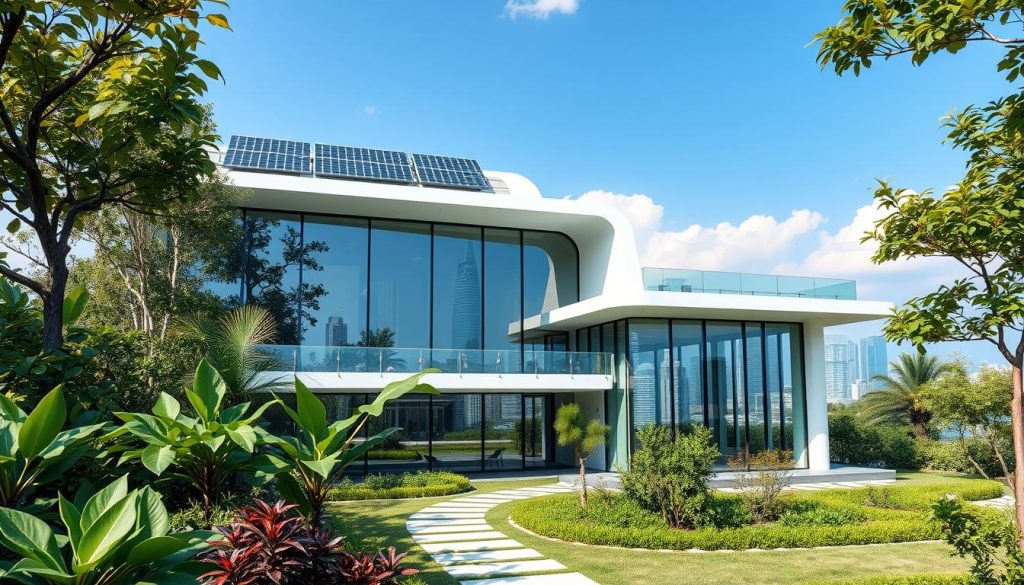
Smart homes are changing real estate technology a lot. People want homes that are easy to use, safe, and save energy. So, builders are adding smart tech to homes and offices.
Smart homes use cool gadgets like smart thermostats and security cameras. These make life better and homes more appealing. Homes with the latest tech are worth more.
- Energy efficiency through smart energy management systems.
- Enhanced security with connected surveillance equipment.
- Convenience from remote-controlled appliances and lighting.
Smart home tech is getting better with time. Soon, homes will use artificial intelligence for better living. This will help save energy and make homes more efficient. In Asia, companies are already making smart home solutions.
Investing in Up-and-Coming Areas
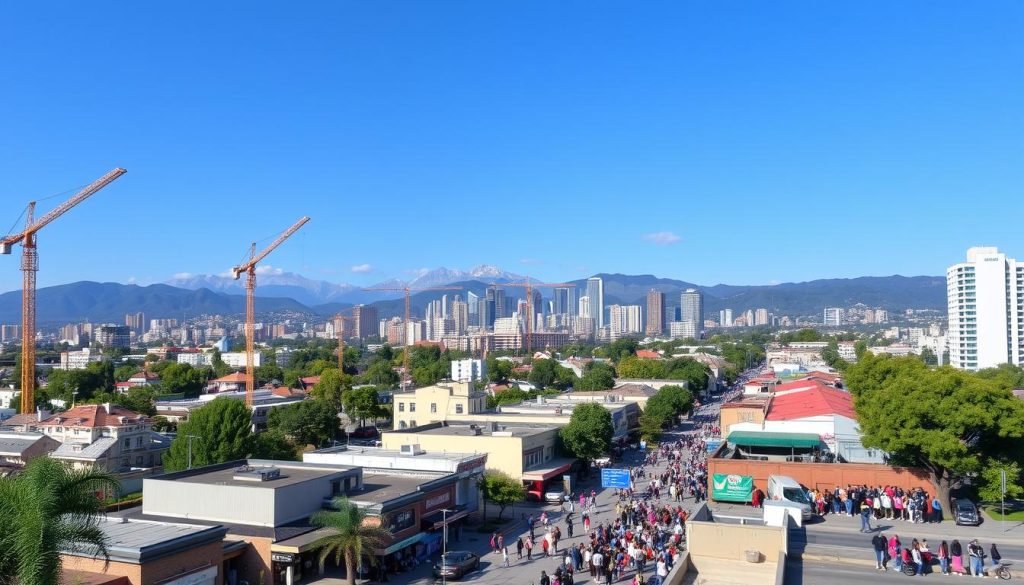
Investing in new areas offers many chances for smart investors. They can tap into the latest trends in Asian real estate. It’s key to know what makes these places grow.
Identifying Tipping Points for Growth
There are signs that show when an area is ready for growth. Important signs include:
- New transport links and facilities make places more appealing.
- More people moving in means more demand for homes and services.
- New businesses and jobs bring life back to areas.
Real examples show how these signs lead to good investments. Cities changing fast often see property values go up. Knowing these signs helps investors succeed in Asian real estate.
Sustainable Housing Solutions
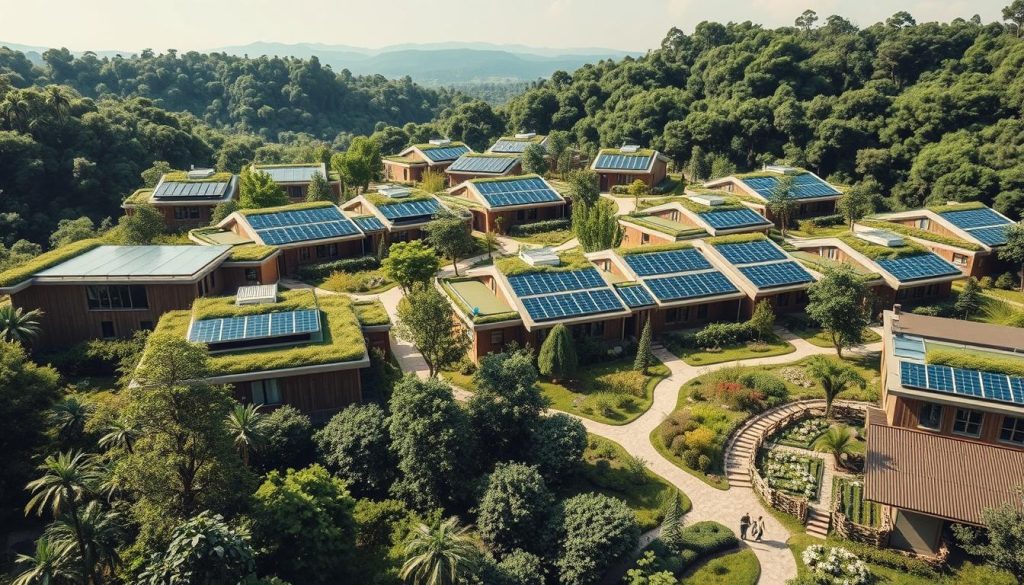
The need for sustainable homes is rising fast. People want to live in a way that’s good for the planet. This change is making homes more valuable and stable in the market.
New building methods are key to green homes. Modular homes are made off-site and put together quickly. They use recycled materials, helping to save resources. These homes also use less energy, which saves money and is better for the planet.
More people want to live in eco-friendly homes. This is making homes with green features more popular. Buyers are looking for homes with solar panels and systems to collect rainwater. This shows that green homes are good for the planet and can make investors money in the long run.
The Importance of Cultural Sensitivity in Real Estate
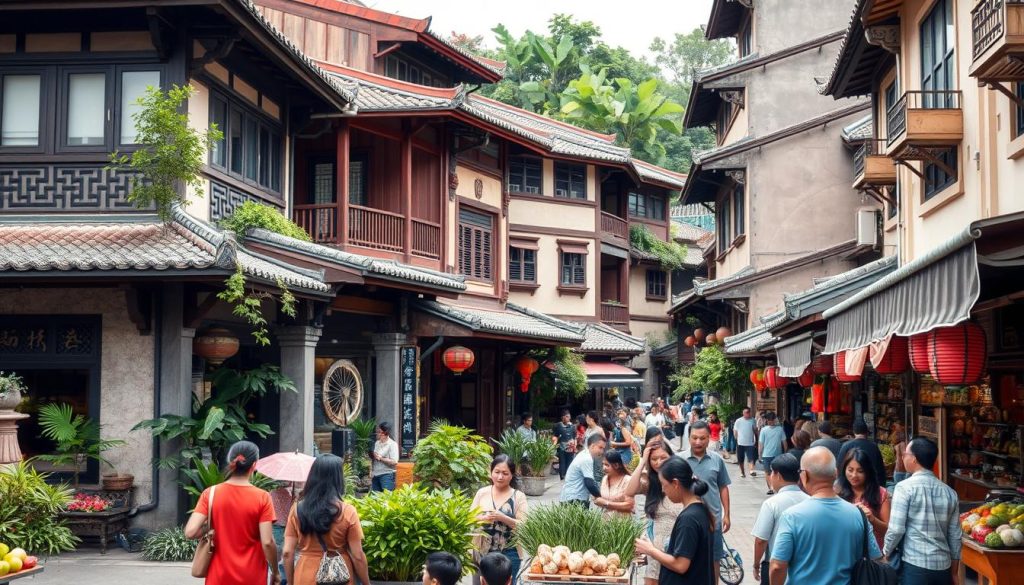
Cultural sensitivity is key to success in Asia’s diverse real estate market. Knowing local customs, beliefs, and practices helps understand the market better. It also builds stronger client relationships, making customers feel valued and respected.
Understanding Local Markets and Practices
Real estate professionals need to know the cultural context of the areas they work in. They must understand differences in negotiation styles, communication, and values. This knowledge helps in making better business decisions.
Using culturally aware strategies is important. This might include:
- Researching local customs and social etiquette
- Engaging with the community to build trust and rapport
- Adapting marketing materials to reflect local languages and symbols
- Hiring local experts who possess valuable insights into market dynamics
Being culturally sensitive improves market understanding and opens up new opportunities. It leads to more sustainable business practices. This benefits both clients and developers.
Real Estate Technology Start-ups to Watch
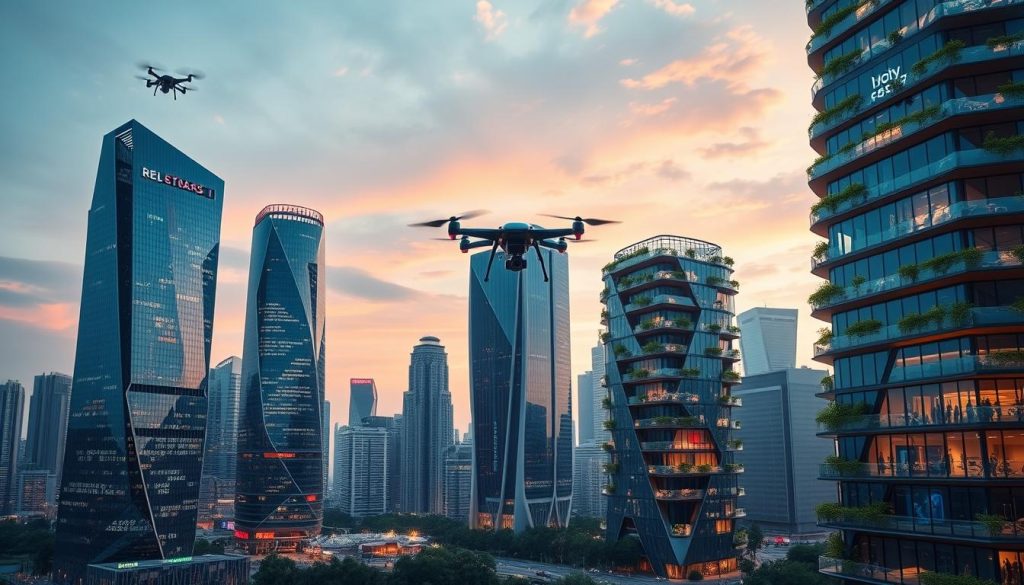
The real estate scene in Asia is changing fast. New start-ups are bringing in fresh ideas with technology. They aim to make buying, selling, and managing properties better.
These companies work to make things more efficient, engage customers better, and improve processes.
Several notable real estate technology start-ups are making big moves:
- PropTech Asia: This start-up uses data analytics to improve property management. It helps businesses run smoother and save money.
- Smart Lease: It offers a platform for automating lease management. This makes things clearer and easier for landlords and tenants.
- HomeSwipe: This app uses augmented reality for property viewings. It lets potential buyers explore properties from anywhere.
These start-ups not only solve current problems but also create new investment chances. They bring in tech innovation that boosts the industry’s future. This supports growth and makes the market more competitive.
Regional Differences in Real Estate Investment
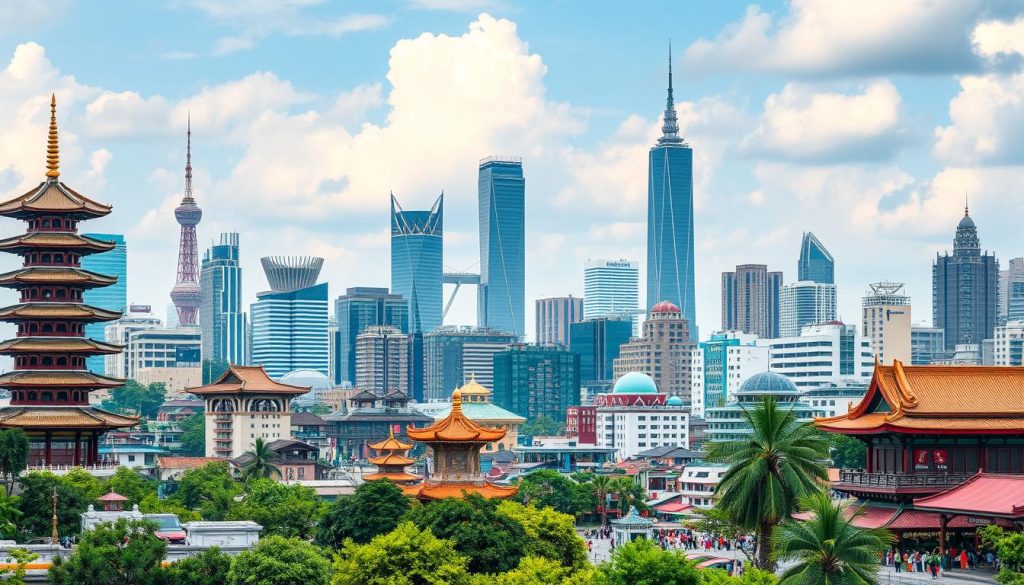
Asia’s real estate markets show big differences. These are due to various economic factors, laws, and cultural aspects. Knowing these differences is key for those looking to invest in real estate across the continent.
In East Asia, countries like Japan and South Korea have well-developed real estate markets. They are driven by tech and urban growth. Investors here often choose established properties and new developments that use smart tech and are eco-friendly.
On the other hand, Southeast Asia’s real estate is quickly changing. Countries like Vietnam and Thailand are growing fast. A growing middle class and tourism are driving this growth, drawing in global investors.
- Economic Stability: Places like Singapore, with stable economies, draw a lot of investment. They offer steady returns.
- Regulatory Framework: Laws and rules can help or block investment. Clear rules make it easier for foreign investors.
- Cultural Insights: Knowing local customs and practices is crucial. It helps in making smart investment plans in different markets.
These differences highlight the need for detailed analysis of Asia’s markets. By understanding these differences, investors can make better choices. They can match their strategies to local needs and increase their profits.
The Impact of Legislation on Real Estate Ventures
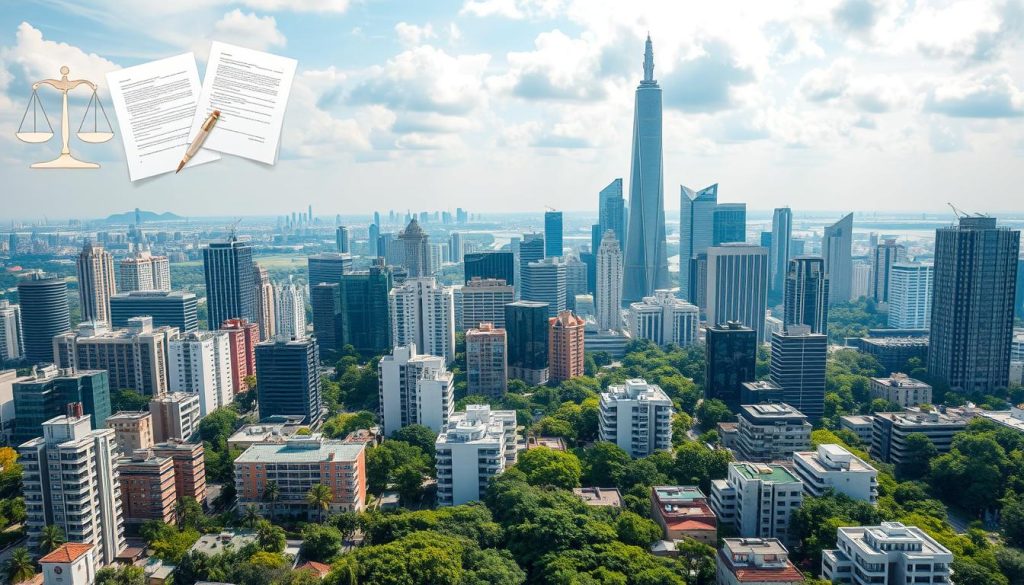
The real estate scene in Asia is greatly influenced by laws and rules. These rules change from country to country, affecting how people invest. For example, laws about who can own property can draw in more or less foreign money.
Property taxes are also key. High taxes might scare off investors, but good tax breaks can encourage more building. Knowing about taxes is crucial for investors wanting to make the most money.
- Environmental laws are now a big part of planning new projects, pushing for green building.
- Changes in laws can bring both problems and chances in different places, shaping investment.
- It’s important for everyone involved to keep up with new rules to succeed in this complex world.
Networking Opportunities in the Asian Real Estate Scene
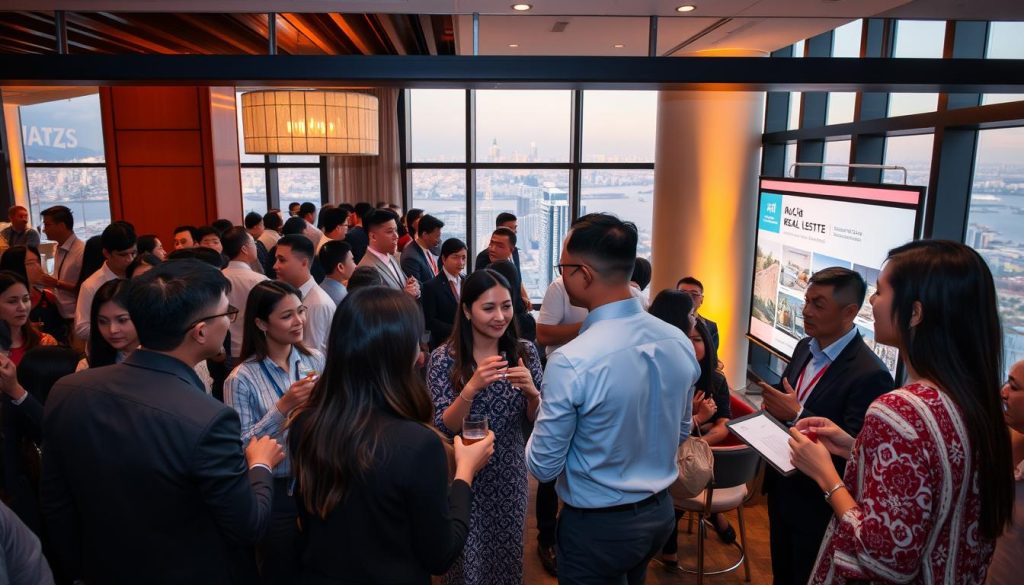
The Asian real estate sector is all about networking. It brings together professionals from all walks of life. These events are great for making connections and learning about the market.
Going to these events can really help your career. You get to share ideas and learn from others. This can lead to new ways of managing properties.
Conferences and forums are key for real estate pros. They offer many benefits:
- Enable collaboration with other professionals at various levels of expertise.
- Facilitate partnerships that may lead to joint ventures on new projects.
- Encourage knowledge sharing, which is essential for adapting to evolving market demands.
- Provide a platform for accessing potential investors and clients.
Being part of networking events can change your career for the better. Strong connections help you grow both personally and professionally. They also create a supportive community in the industry.
Case Studies of Successful Real Estate Innovations
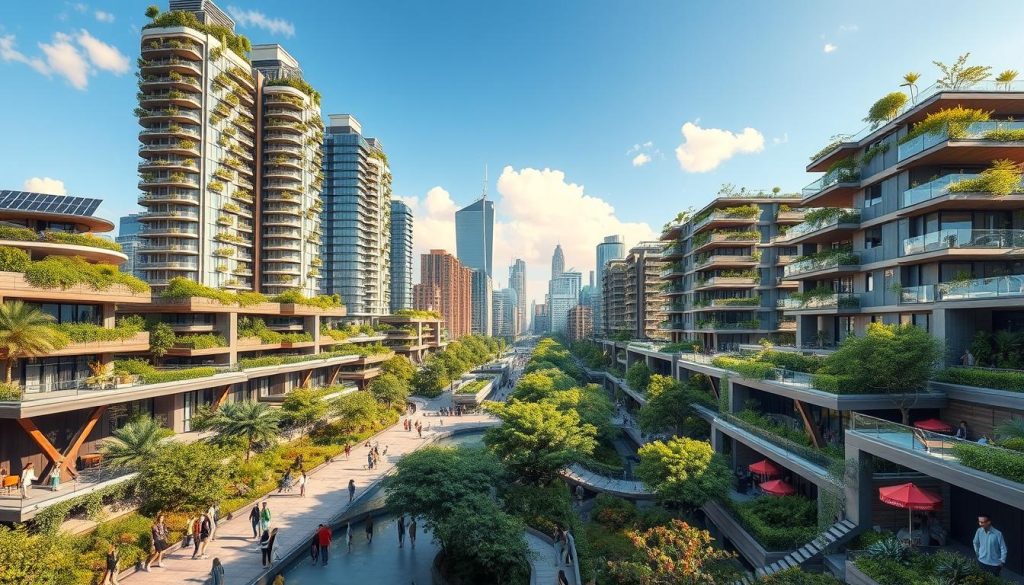
In the fast-evolving Asian real estate scene, many case studies show how new ideas are changing the game. These stories give us a peek into how top players tackle tough market challenges and new trends.
Learning from Leaders in the Industry
Leading real estate firms have come up with creative solutions. These not only solve current problems but also set new standards. Here are a few examples:
- Singapore’s CapitaLand went digital, adding smart tech to their projects. This improved customer service and made things more efficient.
- China’s Evergrande focused on green housing, tackling environmental issues while keeping profits up.
- In Japan, Sekisui House mixed old-world skills with new tech. They built homes that save energy and are cozy, winning over many buyers.
These stories of innovation show the power of adaptability in the Asian real estate world. They inspire a culture of growth and change.
The Future of Real Estate in Asia
The future of real estate in Asia is set for big changes. These changes come from new technologies, shifting populations, and economic shifts. Cities will link up more, and people will move to cities in huge numbers. This means real estate will need to change to meet the demand for green and smart living spaces.
Technologies like artificial intelligence and blockchain will change how we buy and manage property. There will also be a big push for sustainable buildings as people and investors care more about the environment. Real estate experts who adapt to these changes will do well in the fast-paced market.
Looking forward, it’s crucial for real estate experts to think ahead. They need to keep up with market trends and adjust their plans. By doing this, they can handle the challenges of the Asian real estate market effectively.

